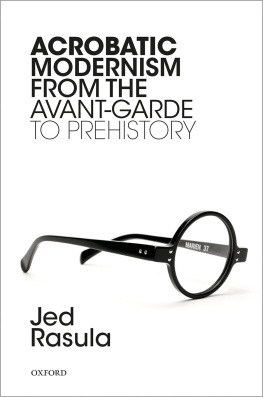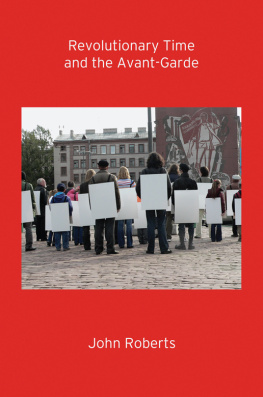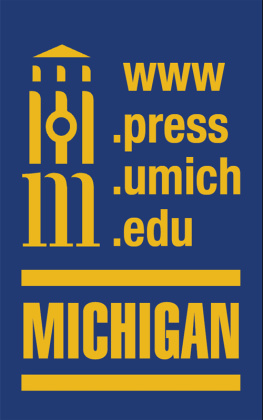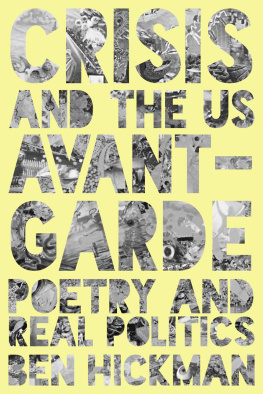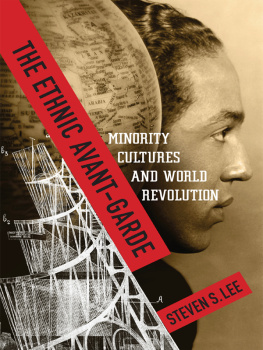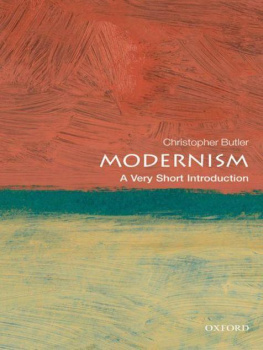OXFORD ENGLISH MONOGRAPHS
General Editors
CHRISTOPHER BUTLER JOHN CAREY KATE FLINT
HERMIONE LEE A. D. NUTTALL FIONA STAFFORD
PAUL STROHM
Modernism,
Magazines, and the
British AvantGarde
FAITH BINCKES


Great Clarendon Street, Oxford 0x2 6DP
Oxford University Press is a department of the University of Oxford.
It furthers the Universitys objective of excellence in research, scholarship,
and education by publishing worldwide in
Oxford New York
Auckland Cape Town Dar es Salaam Hong Kong Karachi
Kuala Lumpur Madrid Melbourne Mexico City Nairobi
New Delhi Shanghai Taipei Toronto
With offices in
Argentina Austria Brazil Chile Czech Republic France Greece
Guatemala Hungary Italy Japan Poland Portugal Singapore
South Korea Switzerland Thailand Turkey Ukraine Vietnam
Oxford is a registered trade mark of Oxford University Press
in the UK and in certain other countries
Published in the United States
by Oxford University Press Inc., New York
Faith Binckes 2010
The moral rights of the author have been asserted
Database right Oxford University Press (maker)
First published 2010
All rights reserved. No part of this publication may be reproduced,
stored in a retrieval system, or transmitted, in any form or by any means,
without the prior permission in writing of Oxford University Press,
or as expressly permitted by law, or under terms agreed with the appropriate
reprographics rights organization. Enquiries concerning reproduction
outside the scope of the above should be sent to the Rights Department,
Oxford University Press, at the address above
You must not circulate this book in any other binding or cover
and you must impose the same condition on any acquirer
British Library Cataloguing in Publication Data
Data available
Library of Congress Cataloging in Publication Data
Data available
Typeset by SPI Publisher Services, Pondicherry, India
Printed in Great Britain
on acidfree paper by
MPG Books Group, Bodmin and Kings Lynn
ISBN 9780199252527
1 3 5 7 9 1 0 8 6 4 2
For Dennis Henry Binckes, 19242006
Acknowledgements
For permission to quote from unpublished materials held in their collections, I am most grateful to the Bodleian Library, Princeton University Library, the Public Records Office at Kew, the Berg Collection, Rare Books and Manuscripts Department of the New York Public Library, the Harry Ransom Research Center at the University of Texas, the library of the University of Edinburgh, the J. D. Fergusson Museum in Perth, and the Archives of the Tate Gallery, London.
I am indebted to the Society of Authors for permission to quote unpublished material from Katherine Mansfield and John Middleton Murry, and to Perth and Kinross Council, and the Design and Artists Copyright Society, for permission to reproduce images. Extracts from Ezra Pound appear courtesy of New Directions and Faber & Faber, unpublished material by Ford Madox Ford courtesy of Michael Schmidt. Bernard Horrocks and David Pilling helped to track down some other, elusive contacts. Some material from this book appeared in Suzanne Churchill and Adam McKibles Modernism and Little Magazines: New Approaches in 2007, for which I would like to acknowledge the assistance of Ann Donahue at Ashgate.
Despite my efforts, some copyright holders remained untraced, or had not replied to correspondence at the time this book went to press. If you hold or administer rights for materials published here, please contact the publisher. Any errors or omissions will be corrected in subsequent editions.
Aside from these are the numerous professional and personal debts I have accumulated. The first word has to go to Peter McDonald, a truly exemplary doctoral supervisor, whose ideas have at many points not only informed, but positively transformed, mine. Bernard Richards, Christopher Butler, and Jon Stallworthy all contributed at key points in the very early stages of my graduate work. Chris Bristow and Anne Fernihough were the most influential tutors of my undergraduate years, without whom it is unlikely I would have pursued an academic career. Ted Bishop, Cathy Clay, Adam McKible, and Suzanne Churchill all added to my thinking on periodical culture, while my examiners Hermione Lee and Laura Marcus made extremely useful suggestions on how the thesis might develop into a book. My two readers at Oxford University Press offered an even more significant commentary on both the thesis and the irst draft of the manuscript, and have been very generous in their support of the project. The same can be said of the editorial and production team at the Press. Throughout, I have been greatly assisted by various librarians and archivists, although the staff at the Bodleian deserve my thanks more than any other. It is, and always has been, a privilege to have such an extraordinary facility on my doorstep. This is quite literally true given the location of Brasenose College, which has also supported me in a variety of ways over the years. Ive been enormously lucky in my friends and colleagues. Special thanks go to Kathy Laing, Paul Burns, Sos Eltis, Alice Staveley, Susan Jones, Brendan Cole, David Goldie, and Angela Smith. Last, but very far from least, are my familyAlun, my mother Marion, and the outlaws, Keith and Marian Ward. I hope you already know that I couldnt have done it without you. The book itself is dedicated to my father, a cleareyed and warmhearted reader of books and persons.
Contents
List of Illustrations
Notes to the Text
Rhythm, the Blue Review, and the New Age are abbreviated to R, BR, and NA in the footnotes. Articles and illustrations that appeared in Rhythm and the Blue Review are allotted full references in the body of the text, and in the footnotes, and for that reason are not mentioned again in the Bibliography. These references respect Rhythms double numbering system between July and September 1912, which causes very little confusion as its dates are unambiguous. The New Age is referred to by date only.
With regard to names, I have opted pragmatically for Ford Madox Ford rather than Ford Madox Huefer, as the book refers regularly to texts written both before and after his change of surname. However, I have retained Albert Rothenstein rather than using the later Albert Rutherston. M. T. H. Sadler (18811957) is generally known under his penname Michael Sadleir. He adopted this to distinguish himself from his father Michael Ernest Sadler (18611943). As this book regularly refers to both men, it will also adopt this convention.
Introduction
Little Magazines: Modernism
in Miniature?
In April 1968, the Times Literary Supplement ran a special feature prompted, it announced, by a curious new publishing enterprisethe reprinting of little magazines:
About two hundred British and American magazines are now expensively available in bound facsimile editions, and there are more to come. Many, it would have been more charitable to forget, and only the most voracious academic machine will be able to assimilate them. But the few really important ones make sense of the whole venture, and in this weeks TLS we feature special articles on some of these.
Of the dozen or so really important ones, nine were allotted a special article:



